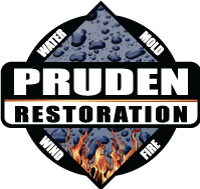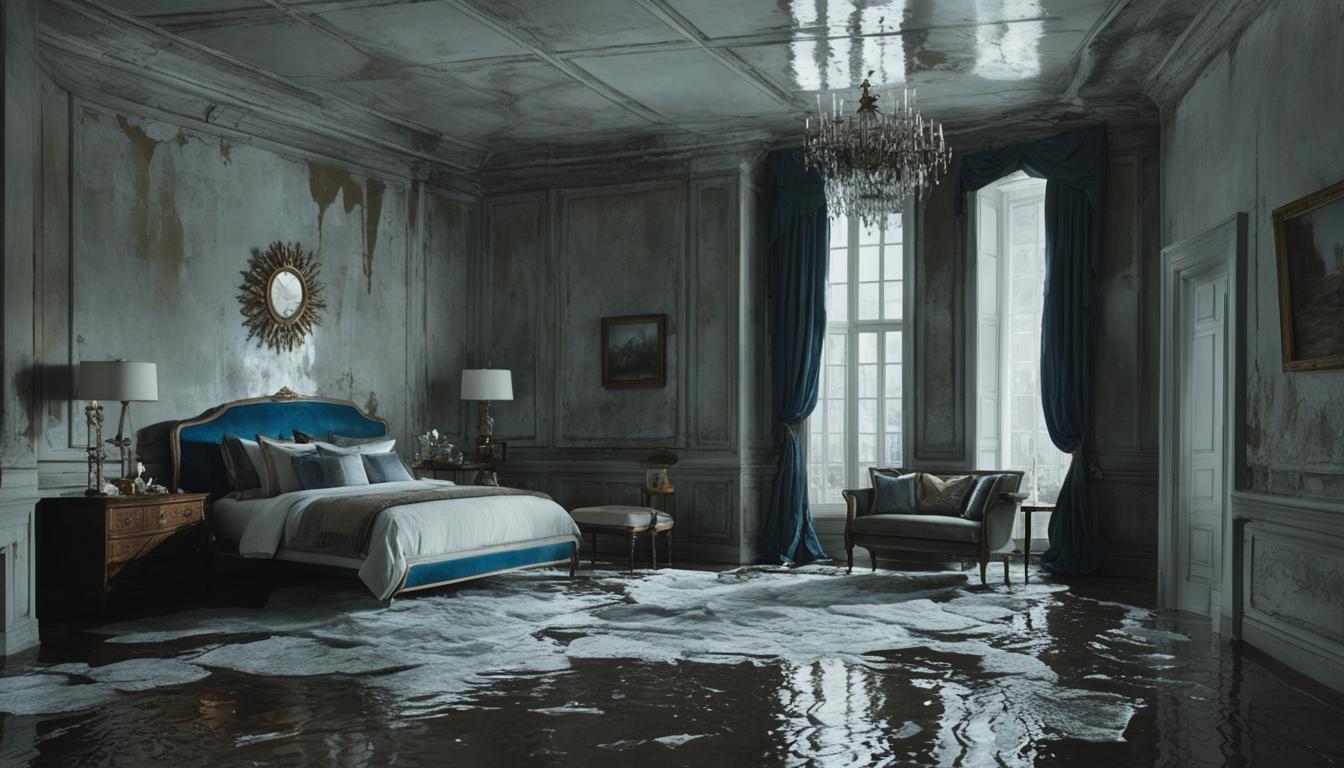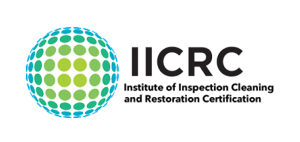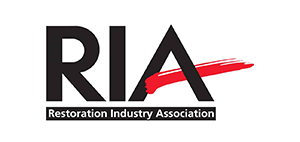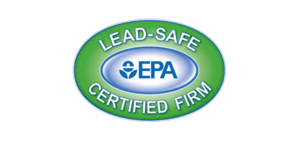Water damage is a common problem that many homeowners face. Whether it’s from a burst pipe, a leaky roof, or a natural disaster, the consequences can be devastating. One of the biggest concerns associated with water damage is whether it is safe to continue living in the home. If you are wondering, “Is it safe to sleep in a house with water damage?”, the answer is not always straightforward.
Water damage can cause a variety of safety concerns that can affect your health and well-being. From mold growth to structural damage, it’s important to understand the risks and take appropriate precautions to ensure your safety.
Key Takeaways:
- Water damage can pose safety risks that affect your health and well-being.
- Mold growth, structural damage, electrical hazards, and indoor air quality are all concerns associated with water damage.
- The risks associated with water damage can vary depending on the extent and severity of the damage.
- It’s important to take appropriate precautions to ensure your safety, including seeking professional help when needed.
- Promptly addressing water damage can prevent further damage and reduce the risk of safety concerns.
Understanding the Dangers of Water Damage
Water damage may seem like a minor inconvenience, but it can pose several dangers to your health and safety. One of the most significant risks of water damage is mold growth. When moisture is left unchecked, it creates a breeding ground for mold, which can lead to respiratory problems, allergies, and other health issues. Mold growth can be especially harmful to those with pre-existing conditions or weakened immune systems.
| Health Risks | Symptoms |
|---|---|
| Allergies | Sneezing, runny nose, itchy eyes, rash |
| Respiratory Problems | Coughing, wheezing, difficulty breathing |
| Headaches | Pressure, pain |
Water damage can also compromise the structural integrity of a building. Water weakens wood and other materials, making them more susceptible to collapse. Electrical hazards are another concern associated with water damage, as outlets, wiring, and appliances can become damaged and pose a fire hazard. Finally, water damage affects indoor air quality by introducing harmful substances such as mold spores and bacteria, leading to respiratory issues and other health problems.
To protect yourself and your loved ones from these dangers, take immediate action when you suspect water damage in your home. Schedule a professional inspection and remediation as soon as possible to avoid potential health and safety risks in the future.
Risks of Mold Growth
Mold growth is one of the most significant risks associated with water damage in your home. When left untreated, water damage can create an environment in which mold spores can thrive and reproduce rapidly. Mold can quickly spread throughout your home, causing health hazards for you and your family.
The potential health risks of mold exposure are numerous. According to the Centers for Disease Control and Prevention, exposure to mold can lead to symptoms including:
- Coughing and chest tightness
- Eye, nose, and throat irritation
- Wheezing and shortness of breath
- Chronic lung illnesses
Individuals with allergies or asthma may experience more severe symptoms when exposed to mold spores. In some cases, mold exposure can even lead to serious infections in individuals with weakened immune systems.
It’s essential to address any water damage and mold growth as soon as possible to minimize the risks to your health and prevent further damage to your home. Professional mold remediation services can help identify and eliminate mold growth and prevent future outbreaks.
| Symptom | Health Effect |
|---|---|
| Coughing and chest tightness | Respiratory irritation |
| Eye, nose, and throat irritation | Minor allergic reactions |
| Wheezing and shortness of breath | Asthma and other respiratory conditions |
| Chronic lung illnesses | Permanent respiratory damage |
Structural Integrity Concerns
Assessing the structural integrity of your water-damaged home is critical to avoiding potentially catastrophic incidents. Water damage can weaken the structure of a building, risking its collapse, which can lead to serious injury or death. In addition, weakened structures may not withstand natural disasters such as earthquakes or strong winds.
If you notice any signs of structural damage, such as cracks in the walls or foundation or sagging ceilings or roof, it’s crucial to take immediate action. Contacting a professional inspector to assess the damage and provide guidance on repairs is highly recommended.
Moreover, if you see any water stains or mold growth on your walls, it’s an indication of a damaged structure. Swift repairs are essential for your safety and the preservation of your home.
Keep in mind that even minor water damage can compound, leading to significant harm to the structural integrity of your home. Don’t delay in taking the necessary precautions to address the risks associated with weakened structures in your water-damaged home.
Electrical Hazards and Safety Precautions
When a home has water damage, it can pose electrical hazards that put you and your family at risk. Exposed wiring and damaged electrical systems are common issues that can arise. If you notice any signs of electrical damage, do not attempt to fix it yourself, as it can be dangerous.
To ensure your safety, it’s important to take the following precautions:
- Turn off the power: If water has entered your home, turn off the power supply immediately. Contact a professional electrician to inspect your electrical system safely.
- Wear protective gear: Always wear gloves and rubber boots while dealing with electrical hazards and water damage.
- Keep appliances dry: Avoid using any appliance or electronic that has been exposed to water or moisture.
- Inspect your home: Inspect your home for any signs of electrical damage. If you notice any exposed wiring or damaged components, call a professional immediately.
Remember, water damage can cause serious electrical hazards in your home. By taking necessary precautions like turning off the power and inspecting your home for any signs of damage, you can ensure the safety of your family and prevent further damage.
Impact on Indoor Air Quality
Water damage can have a significant impact on the indoor air quality of your home. When water enters a building, it can create an environment where mold and bacteria can thrive. These harmful substances can spread throughout your home, causing health problems such as respiratory issues, allergies, and infections.
The presence of mold spores and bacteria in the air can also make it more difficult to breathe, especially for those with pre-existing health conditions. In addition, the musty odor of mold can be unpleasant and affect your quality of life.
The good news is that there are steps you can take to improve the indoor air quality of your home after water damage occurs. It is essential to dry out wet areas and any materials affected by water as soon as possible to prevent mold growth. Using dehumidifiers can also help to remove excess moisture from the air and reduce the risk of mold and bacteria growth.
It’s important to note that even after taking these precautions, it’s advisable to have your home inspected by a professional to ensure that the indoor air quality is at a safe level. A professional can test the air quality of your home and identify any hidden sources of mold or bacteria. Taking these precautions can help to ensure that the indoor air quality of your home is safe and healthy for you and your family.
Conclusion
In conclusion, sleeping in a water-damaged home can pose significant risks to your health and safety. The dangers of water damage include mold growth, structural damage, electrical hazards, and a negative impact on indoor air quality.
To ensure your well-being, it is essential to address water damage promptly and take necessary precautions. You should assess the structural integrity of your home and identify potential electrical hazards. Additionally, you should monitor indoor air quality and take steps to improve it if necessary.
If you suspect water damage or mold growth in your home, seek professional help. Licensed professionals can assess the extent of the damage and provide effective solutions to ensure your safety.
Don’t delay taking action. By addressing water damage promptly and following necessary precautions, you can ensure your safety and well-being in your home.
FAQ
Is it safe to sleep in a water-damaged home?
Sleeping in a water-damaged home can pose various safety risks. It is important to take precautions to ensure your well-being.
What are the dangers of water damage?
Water damage can lead to various dangers, including mold growth, structural damage, electrical hazards, and compromised indoor air quality.
What are the risks of mold growth in a water-damaged home?
Mold growth in a water-damaged home can cause health issues and symptoms such as allergies, respiratory problems, and irritation. It is essential to address mold growth promptly.
Why is assessing the structural integrity of a water-damaged home important?
Assessing the structural integrity is crucial because water damage can weaken the structure of a home, posing risks of collapse or further damage. Identifying and addressing these concerns is essential for safety.
What are the electrical hazards associated with water damage?
Water damage can lead to electrical hazards such as exposed wiring or damaged electrical systems. It is important to identify these risks and follow necessary safety precautions to prevent electrical accidents.
How does water damage impact indoor air quality?
Water damage can affect indoor air quality by promoting the growth of mold spores and bacteria. These substances can lead to respiratory issues and other health problems. Taking steps to improve air quality is essential.
